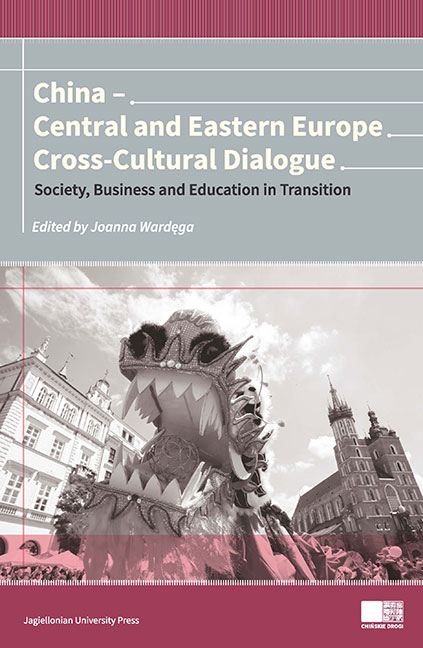Book contents
- Frontmatter
- Contents
- Foreword
- PART I Society and Culture in Transition
- Idealism and Relativism in Ethics: Comparing China and Central Eastern Europe (CEE)
- China's Role in the New World Order
- Redefining and Elderly Caregiving in the 21st Century China and Poland
- Roadmap for Moving to a Low Carbon Economy in China and Poland. Comparative Analysis
- Chinese Community in Poland – the Dynamics of its Development
- Perceptions of China among Central and Eastern European University Students
- Transformation of the Dragon – China's Image in the Polish Media
- Bridges and Obstacles in “the Way of the Ideal Government”: the Transition from Mind Confucianism to Political Confucianism from Jiang Qing's Point of View
- Conceptualizations of Constitutionalism in Recent China's Debates: Preliminary Typologies
- PART TWO Economy and Markets in Transition
- PART THREE Education in Transition
- Contributors
Idealism and Relativism in Ethics: Comparing China and Central Eastern Europe (CEE)
from PART I - Society and Culture in Transition
Published online by Cambridge University Press: 22 December 2017
- Frontmatter
- Contents
- Foreword
- PART I Society and Culture in Transition
- Idealism and Relativism in Ethics: Comparing China and Central Eastern Europe (CEE)
- China's Role in the New World Order
- Redefining and Elderly Caregiving in the 21st Century China and Poland
- Roadmap for Moving to a Low Carbon Economy in China and Poland. Comparative Analysis
- Chinese Community in Poland – the Dynamics of its Development
- Perceptions of China among Central and Eastern European University Students
- Transformation of the Dragon – China's Image in the Polish Media
- Bridges and Obstacles in “the Way of the Ideal Government”: the Transition from Mind Confucianism to Political Confucianism from Jiang Qing's Point of View
- Conceptualizations of Constitutionalism in Recent China's Debates: Preliminary Typologies
- PART TWO Economy and Markets in Transition
- PART THREE Education in Transition
- Contributors
Summary
Introduction
The CEE region
Central and Eastern Europe (CEE) or Eastern and Central Europe are terms frequently used in science, politics and daily life alike. They are customarily used in connection with the part of Europe which differs in more significant respects – social, economic, cultural and political – from both Western and Eastern Europe. According to Halecki (1980), Europe is divided into four parts for historical reasons: Western Europe, West Central Europe, East Central Europe and Eastern Europe. CEE countries are situated geographically in the centre, one part lying within a bloc comprising Sweden, Germany and Italy, and the other between Russia and Turkey. Over the centuries, peoples of very diverse backgrounds have established their own independent states or even empires. In their relationships with Western and Eastern Europe they developed distinctive national cultures, and these have contributed greatly to the development of European civilization. The use of the term CEE as a definition in the political structure of the region strongly emphasizes that these states represent cultures different from those of Eastern Europe – more specifically, Russia (and, later, the Soviet Union) which ruled the whole territory after the Second World War. The anti-Soviet, anti-bolshevist argument can claim many serious protagonists, such as Bibó (1946) or Kundera (1984).
A single European culture is an abstract ideal, but this does not mean that it has no influence on the mentality of people. The sources of European culture are Greek philosophy, Roman law and monotheistic religions – in particular, Christianity – which are integrated into the traditional culture of various peoples. Progress and modernization took root and flourished in these. The most significant steps on the long journey towards modernization were the Renaissance, Humanism, the Reformation and the Enlightenment. According to various authors, the Enlightenment in particular can be considered as the great intellectual movement and historical era that helped establish modernity (Himmelfarb 2005; Israel 2002). The impact of the (ongoing) debate on the nature of science, world-view and the characteristics and consequences of individualistic secular morality is more profound. The basic difference between the CEE region and Eastern Europe is that such movements have more influence in CEE then in the East.
- Type
- Chapter
- Information
- China - Central and Eastern Europe Cross-Cultural Dialogue Society, Business and Education in Transition , pp. 13 - 34Publisher: Jagiellonian University PressPrint publication year: 2016



